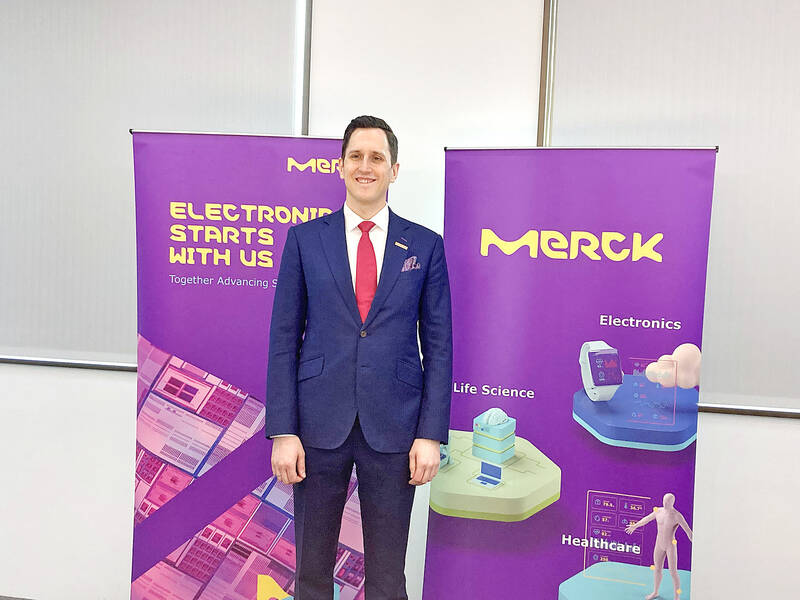Merck Group is mulling augmenting the local supply of some specialty gases and new materials to align with Taiwanese customers’ advance toward cutting-edge semiconductor technologies and artificial intelligence (AI)-related technologies, a company executive said.
As Taiwan is driving technological innovation in the global logic chip segment, Taiwanese firms would require large quantities of chemicals such as hydrochloric acid (HCL), as well as new materials, probably in the next five or seven years, Benjamin Hein, head of Merck’s specialty gases division, told reporters in Taipei on Monday.
“So, this is when we then decide we need to do something about this,” Hein said.

Photo: Lisa Wang, Taipei Times
Merck, headquartered in Darmstadt, Germany, is planning to invest 500 million euros (US$544.14 million) to expand capacity in Taiwan in the next few years, accounting for a major portion of the company’s 3 billion euro “Level Up” global growth program for its electronics business. In Taiwan, Merck last year launched its first-stage investment by building a site in Kaohsiung.
Regarding advanced new process technology, such as high-NA extreme ultraviolet lithography (EUV) tools, which are used to make the most advanced chips, customers would need new photo-resistant materials and different formulated products, Hein said.
Commenting on the demand profile from AI technology, Hein said the innovation comes mostly from the advanced packaging side, adding that one of the issues is how to integrate high-bandwidth-memory (HBM) chips into a logic chip on the same semiconductor device.
A majority of Nvidia Corp’s chips are made in Taiwan, Hein said.
Advanced logic chips and advanced memory chips would require more of certain types of products, he said. For instance, as advanced memory chips are stacking layers, they would require more dopants and HCL used in etching to clean the structure, he said.
The materials used in the manufacturing process of advanced chips are Merck’s focus, as those products would be the main growth drivers for the company over the next two decades, he said.
It is easy to justify Merck’s investment in Taiwan as it is the world’s biggest semiconductor material market and would safeguard that top position over a long period, as TSMC and other semiconductor companies are to continue investing in manufacturing capacity here, despite the US and Europe stepping up efforts to build local chip capacity, Hein said.
“Our ambition is not to be localizing everything in every country because that will be highly inefficient. We cannot be competitive. So we try to use our network around the world to support our customers wherever they go,” he said.
If not localized, Merck would not be able to successfully work with very demanding customers in the semiconductor industry, given the industry’s faster innovation cycles, he said.

Taiwan Semiconductor Manufacturing Co (TSMC, 台積電), the world’s biggest contract chipmaker, booked its first-ever profit from its Arizona subsidiary in the first half of this year, four years after operations began, a company financial statement showed. Wholly owned by TSMC, the Arizona unit contributed NT$4.52 billion (US$150.1 million) in net profit, compared with a loss of NT$4.34 billion a year earlier, the statement showed. The company attributed the turnaround to strong market demand and high factory utilization. The Arizona unit counts Apple Inc, Nvidia Corp and Advanced Micro Devices Inc among its major customers. The firm’s first fab in Arizona began high-volume production

VOTE OF CONFIDENCE: The Japanese company is adding Intel to an investment portfolio that includes artificial intelligence linchpins Nvidia Corp and TSMC Softbank Group Corp agreed to buy US$2 billion of Intel Corp stock, a surprise deal to shore up a struggling US name while boosting its own chip ambitions. The Japanese company, which is adding Intel to an investment portfolio that includes artificial intelligence (AI) linchpins Nvidia Corp and Taiwan Semiconductor Manufacturing Co (TSMC, 台積電), is to pay US$23 a share — a small discount to Intel’s last close. Shares of the US chipmaker, which would issue new stock to Softbank, surged more than 5 percent in after-hours trading. Softbank’s stock fell as much as 5.4 percent on Tuesday in Tokyo, its

COLLABORATION: Softbank would supply manufacturing gear to the factory, and a joint venture would make AI data center equipment, Young Liu said Hon Hai Precision Industry Co (鴻海精密) would operate a US factory owned by Softbank Group Corp, setting up what is in the running to be the first manufacturing site in the Japanese company’s US$500 billion Stargate venture with OpenAI and Oracle Corp. Softbank is acquiring Hon Hai’s electric-vehicle plant in Ohio, but the Taiwanese company would continue to run the complex after turning it into an artificial intelligence (AI) server production plant, Hon Hai chairman Young Liu (劉揚偉) said yesterday. Softbank would supply manufacturing gear to the factory, and a joint venture between the two companies would make AI data

DOLLAR SIGNS: The central bank rejected claims that the NT dollar had appreciated 10 percentage points more than the yen or the won against the greenback The New Taiwan dollar yesterday fell for a sixth day to its weakest level in three months, driven by equity-related outflows and reactions to an economics official’s exchange rate remarks. The NT dollar slid NT$0.197, or 0.65 percent, to close at NT$30.505 per US dollar, central bank data showed. The local currency has depreciated 1.97 percent so far this month, ranking as the weakest performer among Asian currencies. Dealers attributed the retreat to foreign investors wiring capital gains and dividends abroad after taking profit in local shares. They also pointed to reports that Washington might consider taking equity stakes in chipmakers, including Taiwan Semiconductor